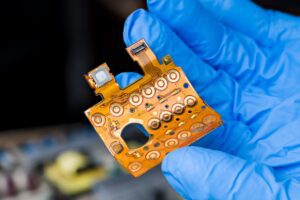
The Royal Mint has launched an innovative factory in south Wales to recover gold from electronic waste, marking a significant step towards sustainable precious metal sourcing for its luxury jewellery line.
This facility, under construction since March 2022, will extract gold from up to 4,000 tonnes of UK-sourced circuit boards from devices such as phones, laptops, and TVs each year.
The Royal Mint, with a heritage spanning over 1,100 years in coin production, aims to use the gold recovered from e-waste for its 886 jewellery range. This high-end line, introduced in 2022, features rings, necklaces, and earrings sold online and at the boutique in Burlington Arcade, Mayfair, London.
Gold extraction at the new facility will involve a two-step process. Initially, the Royal Mint will separate components and metals from the circuit boards at a specialised plant. The gold-containing pieces will then be processed at the south Wales factory using patented chemistry developed by Canadian clean technology firm Excir. This innovative method uses a spinning drum to wash the circuitry pieces in a special acid mix, dissolving the gold in just four minutes—a more energy-efficient alternative to traditional high-temperature extraction methods.
To produce one 7.5g gold ring from the 886 collection, roughly equivalent to the weight of a £1 coin, approximately 600 mobile phones need to be processed. The Royal Mint anticipates expanding the use of the recovered gold to other business areas, including commemorative coins.
This new venture is part of the Royal Mint’s strategy to diversify its operations amid declining cash use. Owned entirely by the UK Treasury, the Royal Mint pays an annual dividend to the government, with the remaining profits reinvested in the business.
“The Royal Mint is transforming for the future, and the opening of our precious metals recovery factory marks a pivotal step in our journey,” said Anne Jessopp, Chief Executive of the Royal Mint.
Read more:
Royal Mint opens pioneering facility in south Wales to recover gold from e-waste





